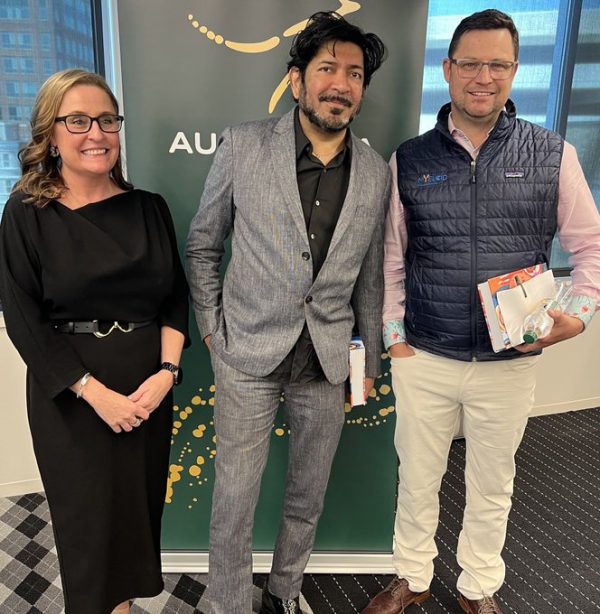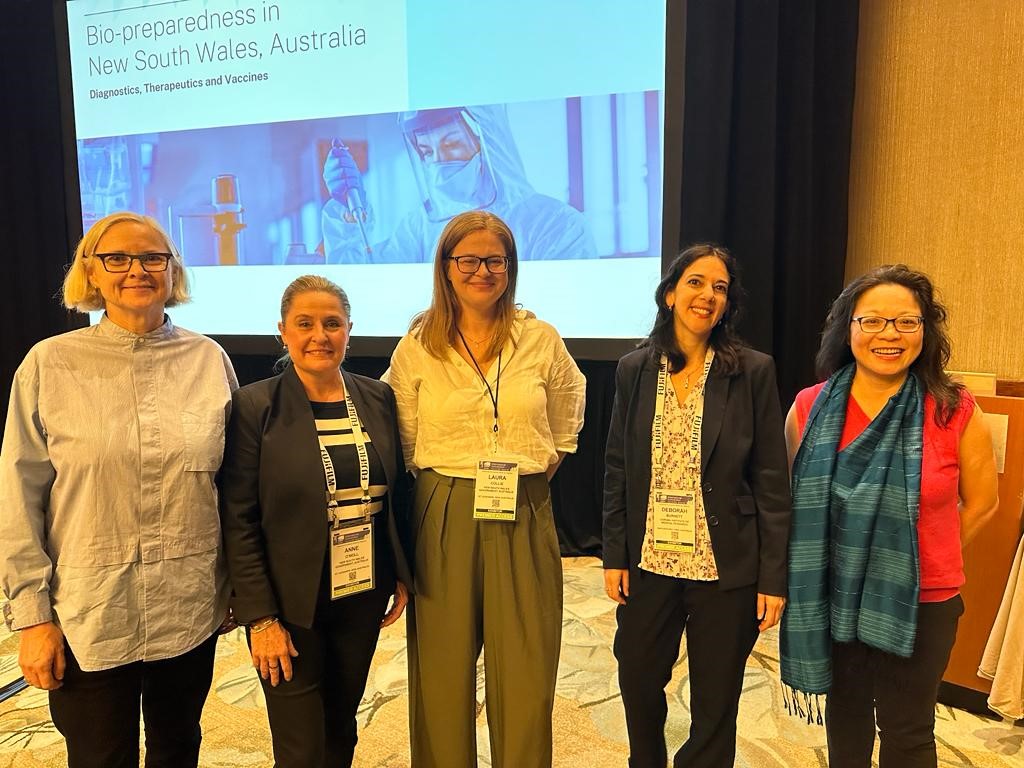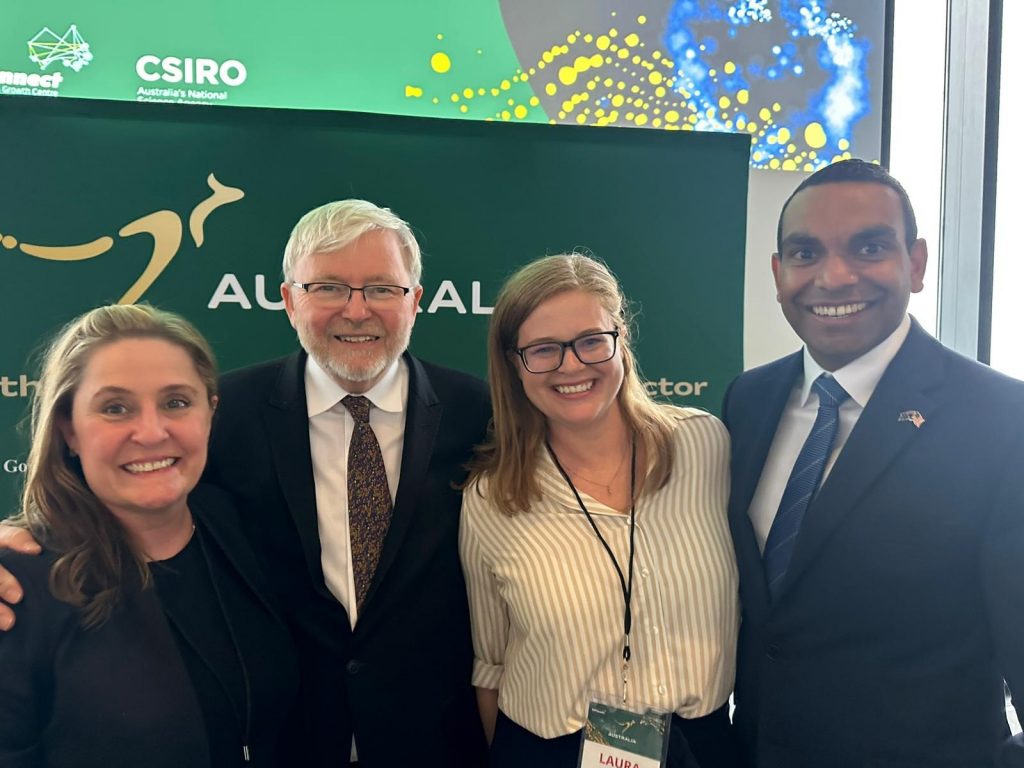Showcasing NSW industry and researchers at the world’s biggest biotech conference
Anne O’Neill, the Director of Enterprise, International Partnerships and Clinical Trials at the Office for Health and Medical Research reflects on an extraordinary week at the annual BIO International Convention (BIO) in Boston.
BIO 2023 brought together over 14 000 biotechnology and pharmaceutical executives from around the world from 5-8 June, offering an immersive experience filled with networking opportunities, educational sessions and information exchange.
As Kevin Rudd, Australia’s Ambassador to the USA, emphatically stated at one of the kick-off events, “The Australian biotech industry stands as a true global powerhouse, with our homegrown corporate brands shining brilliantly on the world stage.”
For several years NSW Health has actively engaged with BIO in partnership with Investment New South Wales; part of our commitment to showcasing the remarkable potential of NSW, our dynamic health and medical research ecosystem and the benefits of collaboration within our thriving sector.
As part of these efforts, we proudly sponsored the participation of the largest NSW delegation to BIO, with 32 NSW organisations, collectively representing the diverse range of the biotech industry. Considering the more than 14,000 attendees, 1,400 exhibiting companies, 250 presenting companies, 140 educational panels, and 50,000 one-on-one partnering sessions throughout the week, the opportunities for attendees were boundless, and itineraries were packed with productive meetings and engagements.
Accompanying us were three exceptional leaders: Adjunct Professor Alison Todd, Dr Deborah Burnett and Adjunct Professor Ruby Lin. Together with my colleague, Dr Laura Collie, we presented an overview of the NSW health and medical research ecosystem and our biopreparedness to a global audience, including the sell-out NSW breakfast panel.
Our main message was crystal clear: NSW has internalised the lessons from the COVID-19 pandemic and is actively preparing for future biological threats. We have established a cohesive ecosystem that encompasses diagnostics, therapeutics and vaccines, underpinned by internationally recognised research and supported by robust clinical trials infrastructure. Moreover, we actively foster collaboration between the public and private sectors to protect our healthcare system and communities.

Leading up to and during BIO, there were many brilliant events featuring insightful speakers and panellists. Here are just some highlights:
Fireside chat with Dr Siddhartha Mukherjee and Dr Daniel Getts
One of the first Team Australia events gave me the incredible opportunity to engage in a thought-provoking fireside chat with two distinguished individuals: Dr Siddhartha Mukherjee, the Pulitzer Prize-winning author of The Emperor of All Maladies: A Biography of Cancer, and Dr Daniel Getts, the co-founder of Myeloid Therapeutics.
Our conversation delved into diverse topics, including a particularly fascinating discussion initiated by Dr Mukherjee, who shed light on the burgeoning middle class just north of Australia. He emphasised that Australia is not merely a population of 25 million, but an integral part of a highly populated region that includes India, which is poised to represent 70 per cent of the world’s population soon.
Dr Getts also advised founders to build relationships “where the capital is, whether by locating their business in cities or regions known for a thriving investment ecosystem, or proactively seeking potential investors at networking events like BIO“.
Global Innovation Hub – Australian Clinical Trial Overview
Leaders from the Australian biotechnology industry, including representatives from Southern Star Research, Bellberry and Linear, provided an insightful overview of why Australia is a brilliant destination for clinical trials. They highlighted our world-class research facilities and expertise, strict regulatory standards, efficient approval process, culturally diverse patient population, stable political and economic environment, skilled healthcare workforce, access to comprehensive healthcare data, and financial incentives and grants.
From Australian Lab to FDA Approval
At an event sponsored by the NSW, Victorian and Queensland Governments, in-depth lessons were shared by Acclime, CSSi LifeSciences and the National Institutes of Health. Speakers offered an overview of key considerations and pitfalls to bear in mind when travelling the path from R&D in Australia to FDA approval.

AusTrade Australia Advanced Therapeutics Roundtable
While my NSW colleagues were busy with meetings back at the convention, my second day at BIO began at a roundtable with Thermo Fisher, Charles River, Cytiva, AbCellera and State and Federal Government and Embassy representatives, including Australia’s Chief Scientist Dr Cathy Foley AO, and Heather Ridout AO, Consul-General New York. We discussed the positive environment in Australia for R&D, talent, diversity, regulatory frameworks and opportunities for investment and trials. It is clear we are seen as a safe set of hands for overseas businesses, and we will need to collectively address capital and workforce issues to ensure we can build sustainable businesses and pipelines
Team Australia’s stand
It was inspiring to see our stand in the exhibition centre bustling with meetings and networking throughout the conference. Supported by the NSW Government, our networking event was particularly popular with international delegates. We were also extremely privileged to showcase and share a range of artwork from NSW Aboriginal communities and some native leaf teas from local native shrubs traditionally used by indigenous Australians.
I concluded the week with a tour of Harvard led by one of our delegates, Nicky Agahari. Nicky is Founder and CEO of Australis Scientific Pty Ltd, and a graduate of Harvard Business School and the NSW Health Commercialisation Training Program. Australis Scientific is a recipient of a special grant from the NSW Medical Devices Fund and in May its In-Confidence Smart Patch was a winner in the annual Harvard President’s Innovation Challenge.
My message to biotech organisations globally is clear: NSW is ready for business. We have a world-class research ecosystem, the largest public health system in Australia, one of the best health systems in the world and a proven track record of translating new ideas into a broad and equitable health system that ensures everyone can access these new developments and be prepared for the future.
I look forward to hearing from all our NSW delegates in the coming months about the impact attending BIO has had on them, their projects and their businesses.
While I find myself physically fatigued, I am utterly exhilarated by the experience. The enthusiastic participation of Australian start-ups, industry professionals, researchers, government representatives and venture capitalists served as a resounding testament to the significance of this sector to the Australian economy.
See here for more information on NSW’s biopreparedness.

Updated 2 years ago